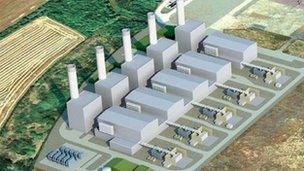£1bn Pembroke power plant: 'tough permit,' says agency
- Published

An artist's impression of the planned power station under construction in Pembroke
The Environment Agency has confirmed it has granted a permit for a gas-fuelled power station in Pembrokeshire but says it has imposed "tough standards".
Friends of the Earth Cymru (FoE) claims RWE npower's £1bn plant in Pembroke will waste heat and damage marine life.
Construction has been going on for the last two years and the plant is due for completion in 2012.
The agency said it has set measures to protect wildlife from discharges and reduce noise.
Planning permission for the plant, which could power up to three million homes, was granted by the UK government in 2009.
Water discharges
FoE have claimed the plant does not use waste heat efficiently and that warm water discharges could have a damaging effect on the Pembrokeshire Marine Special Area of Conservation (SAC).
The environmental campaign group said the heat could be used to power two nearby liquefied natural gas (LNG) terminals rather than entering the sea.
FoE's Welsh director Gareth Clubb said: "This plant is still going to have a devastating impact on one of Europe's most important wildlife sites, it's still going to be using second-rate technology and it will still be throwing away energy equivalent to 40 per cent of Wales' electricity demand."
The Environment Agency Wales said it had carried out "extensive" investigations into the power station's potential impact before reaching the decision.
Legislation
In a statement, the agency said that although there will be "some small changes" in areas around the plant, "the SAC as a whole would be protected".
"The assessments show that the site will comply with the relevant environmental legislation," the statement continued.
The agency said it is imposing measures including;
An acoustic barrier to protect local residents from noise
Tight limits on emissions of nitrogen oxides to protect air quality and wildlife habitats
A maximum limit on the temperature of water discharges
A condition to reduce discharges of nutrients which could cause problems such as algae
Steve Brown, area manager for Environment Agency Wales, said: "This decision today is the result of one of the most intensive assessments we have ever carried out in Wales.
"The Pembrokeshire Marine SAC is one of the most important and environmentally sensitive locations in Wales and must be protected by law.
"In issuing this permit today, we believe we have made sure that the local environment has been protected but at the same time safeguarded energy security and the economic interests of the area."
- Published9 November 2011
- Published18 July 2011
- Published20 June 2011